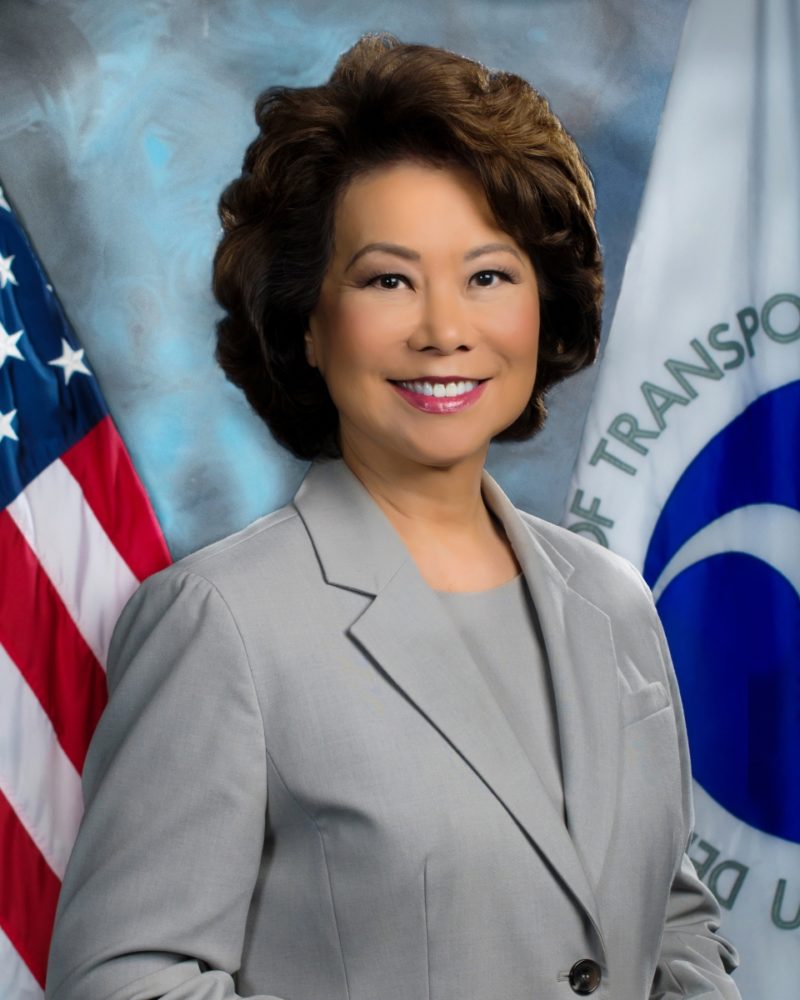
Secretary of Transportation Elaine Chao told the House Transportation and Infrastructure Committee on Tuesday that the Trump administration was looking at all funding options to rebuild and repair the country’s infrastructure.
Chao responded to more than two hours of questions from congressmen seeking answers about the administration’s infrastructure proposal, which was released last month and aims to stimulate at least $1.5 trillion in investment in infrastructure by states, local governments and the private sector. The president’s plan includes a minimum of $200 billion in direct federal funding over 10 years. Chao also testified to the Senate last week on the infrastructure proposal.
Chao said the administration was implementing a paradigm shift that would empower states to make decisions on how money for infrastructure is raised and spent.
All options for funding should be considered, she said, adding that federal dollars should not be the primary source of revenue, but be used “as seed money to incentivize non-federal investment in infrastructure.”
In addition, Chao said the administration would provide for the needs of rural America, work to streamline the permitting process and reduce unnecessary and overly burdensome regulations.
Rep. Elizabeth Esty (D-CT), countered that the administration’s budget shifted the responsibility of funding infrastructure back onto the states and local governments, governments already charged with funding their own roads and bridges.
“You have personally called this a new paradigm in infrastructure investment where the federal government takes a back seat in the funding process,” Esty said. “I’m hearing this on the local level … they see this as pushing the problems down on the states and local government. Given that states already provide the majority of funding for highway and transit projects, why does the federal government want to put more of the burden on local governments, many of which are already strained, and those that are struggling economically that need this the most are also going to be hit really hard by this shift.”
Chao said that while the federal government only owns 10 percent of the nation’s roads and bridges, it accounts for 20 percent of that funding. Historically, she said, infrastructure was in the hands of local governments, not the federal government. “From the beginning of our history, a lot of the infrastructure was done by the local governments,” Chao said. “So there has been no rollback. The federal role was only confined to the interstate. There are many roads and bridges that are not part of the federal infrastructure.”
Chao said that the administration was looking to expand how infrastructure is funded, especially when it comes to public private partnerships, or P3s.
“We want all funding and financing options to be available, because that’s what it is going to take to make all this possible,” she said. “We should look to other countries, like Australia and many European countries, in which there are public private partnerships and asset recycling. In some of our communities, they do not allow these other options … I would encourage all of us to look at all the options and not disallow or forbid them from being used.”
In a tense exchange with Rep. Albio Sires (D-NJ), Chao reiterated that states, especially states like New Jersey and New York, need to step up to the plate when it comes to funding roads and bridges.
Sires asked what had changed between a meeting between lawmakers from New York and New Jersey and the administration in 2017 when it seemed as if the administration was enthusiastic about working with the two states to help fund a tunnel project under the Hudson River and other improvements to the rail and transit systems that are critical to the region.
“In that meeting on Sept. 7, 2017, we were very polite and cordial, but there was no commitment at all,” Chao said, of the Gateway Project that is estimated to total $30 billion. “New York and New Jersey have got to up their local share,” she said.
In responding to Rep. Eleanor Holmes Norton (D-DC), who asked why the department had appropriated and authorized, but not released more than $6 billion in funds, Chao said she felt Norton’s figure was inaccurate, and blamed any delays on Congress for not confirming some of Trump’s top transportation nominees until only recently.
Rep. Frank LoBiondo (R-NJ) asked why the administration was cutting more than $1 billion from the Federal Aviation Administration research and development. “This essentially freezes them and makes them dead in the water,” he said.
Chao testified that although there is a lot of research money available, research funds are not used very well. “We’re in the process of figuring out where is all this money going and how is it achieving the stated purposes of the department’s mission?”
Committee Chairman Bill Shuster (R-PA), in his opening remarks, said any infrastructure plan must be bipartisan if it is going to pass Congress. “I plan to work with Ranking Member (Peter) DeFazio and my colleagues to develop a plan that attracts bipartisan support, and can pass the Senate. To do that, we have to be realistic about our needs, and how we can address them in a fiscally responsible way,” Shuster said.